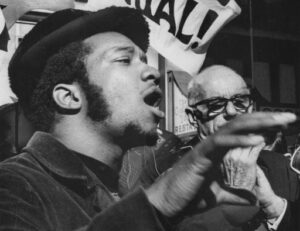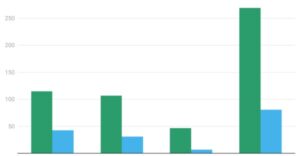Every four years, you can count on a group of prominent left-of-center figures to issue a statement aimed at the broad left urging a vote for the Democratic Party presidential candidate. Whether it’s the positive case of “Progressives for Obama” or the fear-induced call to support the “lying neoliberal warmonger,” over the fascist-wannabe, the aim is the same. And that is to rally millions increasingly fed up with the feeble, corporate-controlled “opposition party” to put off any thought of voting for a third party, to shelve their doubts and to get in line. In fact, in many cases, it’s the same people refurbishing their argument, as when the core 2008 team of “Progressives for Obama,” reunited earlier this year to urge the Green Party to neuter itself in the 2020 election.
The “Open Letter to the Green Party for 2020” that prominent figures such as Noam Chomsky, Barbara Ehrenreich, Bill Fletcher, Jr., and Leslie Cagan signed calls on the Greens to run a “safe state” campaign. In “swing” states where the electorate is closely balanced between Democrats and Republicans, the Greens should stand down, so as not to provide an alternative that could pull votes away from the Democrat, the Open Letter advises. The Open Letter presents itself as a response to long-time Green Party activist and socialist Howie Hawkins’ article defending the Greens’ independent campaigns in 2000 and 2016. In his article, Hawkins demonstrated that the Electoral College and the Democrats’ own lackluster efforts—and not the Greens—cost the Democrats those elections.
Even when conceding most of the Hawkins’ points, the Open Letter writers won’t have any of it. On 2016, they write:
If Clinton got Jill Stein’s Green votes in Pennsylvania, Wisconsin, and Michigan, Clinton would have won the election. Thus, the Green Party’s decision to run in those states, saying even that there was little or no difference between Trump and Clinton, seems to us to be a factor worthy of being removed from contested state dynamics, just like the Electoral College is a factor worthy of being removed across all states….
If during the 2020 election campaign, the Green candidate campaigns in contested states knowing that he or she might be winning votes that would otherwise have gone to Sanders or to Warren or whoever, causing Trump to win the state and win the electoral college, how could that possibly evidence [the Green claim of] wanting Trump to lose as much as anyone?
While they try to frame the discussion with the Green Party as one about tactics toward goals that all of the left should support, they give the game away in their last appeal:
But real solutions require Trump out of office. Real solutions will become far more probable with Sanders or Warren in office. Real solutions will become somewhat more probable even with the likes of Biden in office.
In other words, they are prepared, like so much of the non-left Democratic electorate, consultants and pundits to support “anyone but Trump,” including Biden, whose fealty to the finance industry and support for the 1994 Crime Bill and the 2003 Iraq war should provide more than enough evidence to disqualify him as even a “lesser evil” in 2020. If Bernie Sanders does not become the Democrat nominee, and someone like Biden or even billionaire Michael Bloomberg is selected, look for another open letter from some or all of authors urging a vote for them.
In his response to the Open Letter, Hawkins made a strong defense of independent politics and why the left can’t rely on the Democrats to fight the right. He added:
The historical experiences and power structure analyses that yielded the traditional socialist principle of working-class political independence in 1848 are not even discussed by most progressives and self-styled socialists today.
Unfortunately, Hawkins is right on the money on this point. Whereas the authors of the Open Letter and organizations like the Communist Party have long urged support for the Democrats, one of the two main capitalist parties that have ruled the U.S. since the time of Karl Marx, other organizations that had long supported the principle of political independence from the capitalist parties have fallen by the wayside. Socialist Alternative is “all-in” for Bernie Sanders’ run for the Democratic presidential nomination. Support for Sanders and socialists running in the Democratic Party were the underlying political reasons for the 2019 dissolution of the International Socialist Organization, confirmed with the migration of many of its leading members to DSA and Bernie 2020.
The main reason for these political shifts is, of course, the presidential campaign of Sanders, and to a lesser degree, the prominence of “democratic socialist” members of Congress, such as Rep. Alexandria Ocasio-Cortez (AOC). For many on the socialist left today, the Sanders campaign appears to offer a unique opportunity to build a new socialist movement that will transform U.S. society. We’ll see if this is really true, but while we investigate this, it’s worth remembering the words of the late scholar and activist Manning Marable. In analyzing civil rights leader Jesse Jackson’s first run for the Democratic presidential nomination president in 1984, Marable, then a vice-chair of DSA, wrote:
The essence of the Jackson campaign was a democratic, antiracist social movement, initiated and led by Afro-Americans, which has assumed an electoral mode. Its direct historical antecedents—the Montgomery bus boycott of 1955-56, the formation of the SNCC and the sit-in movement of 1960, the Birmingham desegregation campaign of 1963—were revived in a new protest form within bourgeois democratic politics. . . . The campaign illustrated the capacity of a strong social movement to reshape the ideological and political orientation of its leaders, even charismatic but flawed spokespersons such as Jackson. And it also decisively placed on the American political agenda the possibility of a transitional progressive strategy that would create a viable, mass alternative to the two-party, bourgeois democratic system.[1]
Anyone who has read the innumerable pro-Sanders articles in venues such as Jacobin or Current Affairs should see similarities between what Marable wrote decades ago and what’s being written about Sanders today. And it goes without saying that Jackson’s campaigns in 1984 and 1988 didn’t produce the type of social change or independent organization that Marable proposed.
Of course, history doesn’t repeat itself, and today’s Sanders supporters have a much bigger subjective factor in the race—the 60,000-strong DSA. DSA and its most ideologically coherent spokespeople around Jacobin and the Bread and Roses caucus have fashioned a “Marxist” argument that asserts a goal of long-term political independence from the Democrats after democratic socialists like Sanders or AOC prove their popularity by running as Democrats. Perhaps the most theoretically elaborated statement of this position is Jared Abbott’s and Dustin Guastella’s “A Socialist Party in Our Time?” (Catalyst, Summer 2019) Abbott and Guastella propose that socialists create a “political party surrogate” that builds a base of support independent of the Democratic Party establishment while its candidates run—in the here-and-now— on the Democratic Party ballot.
This proposal, which, as its authors write “even under optimal conditions, the chances of success are low,” does have an important impact today. And that is providing a radical-sounding theoretical justification for supporting Democratic Party candidates. The promise of socialist independence in the future is what fuels today’s new socialists to eschew political independence from the Democratic Party today.
In a thoughtful article, DSA member and Sanders supporter Andrew Sernatinger analyzes what this means in the current context. He notes that the 2019 DSA convention’s votes to support Sanders also included provisos that DSA would work independently of the Sanders campaign and through its efforts seek to “build working-class organization beyond the Sanders campaign”. Sernatinger reviews what DSA members are actually doing for the Sanders campaign and finds their political practice to be at odds with the “class struggle election” approach the 2019 convention approved.
DSA has generally run its operations parallel to the Sanders infrastructure, which blurs the lines between DSA and Sanders, especially as our members become staff for his campaign. Whether you think that is good or bad, it is not politically independent. The danger is substituting the candidate’s electoral strategy (de-prioritizing local efforts in favor of phonebanking/canvassing in early primary/battleground states) in place of DSA’s efforts to build a lasting political force, as the Convention agreed.
Sernatinger, a union activist, points out that the campaign-run Union Members for Bernie has displaced more grassroots formations like Labor for Bernie, “diminish[ing] the capacity of the independent initiative in favor of the campaign-driven one.”
Other DSA members will disagree with Sernatinger, as some already have, but the pressures he points out are both understandable and inevitable. And they do raise the question about the viability of the “support Democrats today so we can break from them tomorrow” perspective embedded in what’s come to be called a “dirty-break” strategy.
There are many problems with this approach, of which three can be highlighted. First, as Hawkins argues, it doesn’t project an independent left profile with its own organizational life. “Democratic socialism” looks like just another choice on the menu for Democratic voters. Second, the more success the “ballot-line” strategy has—the more AOC-like candidates are elected as Democrats—the less likely will be the desire to break from the Democrats. Why give up a winning hand? Third, as long as the fight is carried out inside the Democratic Party, the pressure will be on the socialists to adapt to their surroundings.
This type of adaptation has already begun to show itself, at least at the level of the self-appointed spokespeople for these politics. Jacobin publisher Bhaskar Sunkara’s pro-Bernie stumping from his Guardian column provides multiple examples, from justifying Sanders’ acceptance of an endorsement from podcaster Joe Rogan (who has a long record of racist and transphobic statements and promoting right-wing politics and conspiracy theories) to urging Democratic voters not to panic about Sanders’ ascension: “. . . he’s far less of a radical than either his most ardent supporters or implacable foes care to admit.” Sunkara is correct about Sanders’ politics, but that’s hardly an endorsement for Sanders as a tribune for socialism.
Even more indicative was a recent Jacobin article promoting Democratic Wisconsin Sen. Tammy Baldwin as a smart choice for Sanders’ running mate. The problem here has less to do with the pros and cons of Baldwin herself, but with the logic of “ticket balance,” uniting the Democratic Party, and winning “Obama-to-Trump” voters offered as rationales for Baldwin. One wonders why a publication ostensibly committed to “socialism in our time” features an article whose logic tracks closely with mainstream punditry and one of whose preoccupations is Democratic Party unity.
And yet in the end, Democratic Party unity is what just about everyone who has given up on independent political action in 2020, agrees on. We know the authors of the Open Letter support it. And as Sanders never shrinks from saying, he is committed to supporting whoever the Democrats nominate against Trump. AOC also put it very clearly: “Bernie has said this, I absolutely believe this: whoever gets the nomination, we have to rally behind them, no matter who it is. And I would hope that everybody would do so if Bernie is the nominee as well.” If Ocasio-Cortez doesn’t even agree with a “Bernie-or-Bust” perspective for the 2020 election, will the millions whom she influences act differently? And if they don’t, another election cycle will go by with the left rallying support for the Democrats instead of for a left-wing alternative to them.
[1] Manning Marable, “Rainbow Rebellion: Jesse Jackson’s Presidential Campaign and the Democratic Party” in Black American Politics (London: Verso, 1985), 247-248.
Lance Selfa
Lance Selfa is the author of The Democrats: A Critical History (Haymarket, 2012) and editor of U.S. Politics in an Age of Uncertainty: Essays on a New Reality (Haymarket, 2017).




